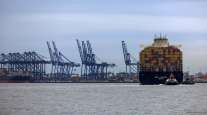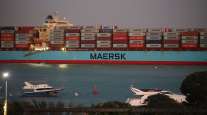Maersk Shares Plunge as Container Line Underperforms

A.P. Moller-Maersk A/S reported an unexpected loss after its container line, the world’s biggest, conceded market share and rising costs outpaced freight rates.
Shares fell the most in 23 months.
Maersk had a loss before interest and tax of $3 million in the first three months of the year, the Copenhagen, Denmark-based company said in a statement May 17. Analysts had expected a profit of $211 million.
RELATED: World’s biggest container liner looks for deals outside shipping
Maersk said the results were “unsatisfactory” and that it now plans a number of “short-term initiatives to improve profitability.” Maersk’s container volumes grew just 2.2% in the first quarter, when adjusting for acquisitions. That was below estimated global demand growth of 3-4%, Maersk said.
“In our ocean segment, we have a cost problem, and we have too much capacity,” CEO Soren Skou said in a Bloomberg TV interview with Guy Johnson. “We need to take capacity out in order to get our unit costs down.”
Shares fell as much as 10% in Copenhagen, the biggest decline since June 24, 2016. The stock now has lost 16% this year, compared with a 1.1% advance in the Stoxx Europe 600 Index.
“It’s clear from both the numbers and the wording that this earnings report is disappointing,” Per Hansen, an investment economist at Nordnet AB, said in a note.
RELATED: A caution from the world’s biggest shipping line
Freight rates rose 7% in the first quarter from a year earlier, but Maersk’s costs per transported container rose 12% due to higher bunker fuel prices and currency headwinds. “Therefore, despite strong growth in revenue, earnings were at an unsatisfactory level,” Maersk said.
Maersk’s ocean segment, which covers the container shipping activities and includes last year’s acquisition of Hamburg Sud, reported a 38% rise in first-quarter revenue to $6.81 billion. The unit reported a 1.7% increase in earnings before interest, tax, depreciation and amortization, to $492 million.
Maersk maintained its 2018 forecast of group EBITDA, or earnings before interest, taxes, depreciation and amortization, a range of $4 billion to $5 billion but added it now sees “increased uncertainties due to geopolitical risks, trade tensions and other factors impacting container freight rates.”




